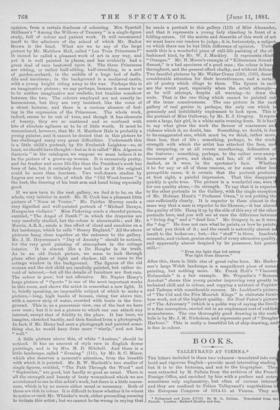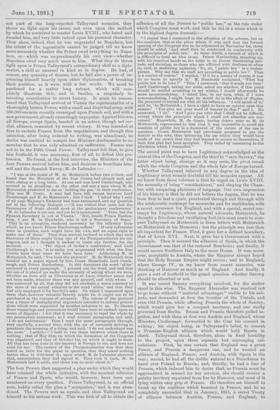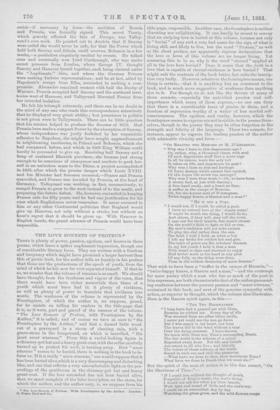BOOKS.
TALLEYRAND AT VIENNA.* Tun letters included in these two volumes—translated into ver lucid and vigorous English—provide most interesting reading but it is to the historian, and not to the biographer. The were extracted by M. Pallain from the archives of the Frolic Foreign Office, and enriched by him with a preface and notes sometimes only explanatory, but often of curious interes and they are confined to Prince Talleyrand's negotiations i the European Congress of 1814.15 at Vienna. They are
* Tolteurand and Louis XVIII. By M. G. Pallain. Translated from the French. London ; Richard Bentley and Son.
not part of the long-expected Talleyrand memoirs, they throw no light upon his career, not even upon the method by which he contrived to master Louis XVIII., who hated and dreaded him, and very little indeed upon his personal character. They show, indeed, that he was ungrateful to Napoleon, but the extent of the ingratitude cannot be judged till we know more accurately whether the Prince owed everything to Napo- leon, or—which was unquestionably his own view—whether Napoleon owed very much more to him. What they do throw light upon is Prince Talleyrand's extraordinary skill as a diplo- matist, a skill as unusual in kind as in degree. He had, of course, any quantity of finesse, but he had also a power of im- pressing himself heavily upon other diplomatists, of breaking their position, as it were, with a few words. We must be pardoned for a rather long extract, which will com- pletely illustrate this, and is, besides, a singularly in- teresting contribution to secret history. It must be remem- bored that Talleyrand arrived at Vienna the representative of a thoroughly beaten Power, with a small and dispirited army, with 300,000 enemies recently encamped upon French soil, and with a new government, already exceedingly unpopular. Against him was all Europe, except Spain, banded in an active, though not cor- dial, alliance, cemented by recent victory. It was intended at first to exclude France from the negotiations, and though this intention, after being reduced to writing, was abandoned, no device was omitted to compel her Minister-Ambassador to re- member that he was only admitted on sufferance. France was not to be the Fifth Great Power. Talleyrand felt that, to give him foothold, it was necessary, first of all, to defeat this pre- tension. He found, at the first interview, the Ministers of the four Powers arrived before him, and desirous to humiliate him- self and the Spanish Envoy, M. de Labrador :—
"I was at the house. of M. do Metternich before two o'clock, and found that the Ministers of the four Courts had already met, and were sitting at a long table. At one end was Lord Castlereagh, who seemed to be presiding ; at the other end was a man whom M. de Metternich presented to me as ' holding the pen' in their conference. This was M. Gentz. A seat had been left vacant between Lord Castlereagh and M. de Metternich ; this I took. I asked why I only of all your Majesty's Embassy had been summoned, and my question
led to the following dialogue It was wished that none but the Secretaries of State should meet at the preliminary conferences.'
M. do Labrador is not one, and yet he is summoned.' True, but the Spanish Secretary is not at Vienna.' But, beside Prince Harden.
berg, I see M. de Humboldt, who is not a Secretary of State.' That is an exception, rendered necessary by the infirmity from which, as you know, Prince Hardenberg suffers." If only infirmities were in question, each might have his own, and an equal right to make use of them.' They then seemed inclined to admit that each Secretary of State might bring one of the Plenipotentiaries his col- leagues, and so I thought it useless to insist any further, for the moment 'The object of to-day's conference,' said Lord Castlereagh to me, to make you acquainted with what the four Courts have done since we have been here.' Addressing M. do Metternich, he said, You have the protocol.' M. de Metternich then handed me a paper signed by him, Count Nesselrode, Lord Castle. reagh, and Prince Hardenberg. In this document the word allies' occurred in every paragraph. I pointed out the word, and said that the use of it placed me under the necessity of Biking where we were, whether we were gill at Chaumont or at Laon, whether peace had not been made, whether there was any quarrel, end with whom. I was answered by all, that they did not attribute a sense contrary to the state of our actual relations to the word allies,' and that they had only employed it for brevity's sake. On which I impressed upon them that, however valuable brevity might be, it ought not to be purchased at the expense of accuracy. The tenour of the protocol was a tissue of metaphysical arguments intended to enforce proton. sions which were supported by treaties unknown to us. To discuss those reasonings and pretensions would have been to embark upon an ocean of disputes : I felt that it was necessary to repel the whole by one peremptory argument ; so I read several paragraphs, and said, do not understand.' Then I read the same paragraphs through, very carefully, a second time, with the air of earnestly striving to penetrate the meaning of a thing, and said, I do not uncleretand any the more.' I added,—' I hold to two dates between which there is nothing ; that of May 31st, on which the formation of the Congress was stipulated, and that of October 1st, on which it ought to meet. All that has been done in the interval is foreign to me, and does not exist for me.' The answer of the Plenipotentiaries was that they cared so little for the paper in question, that they asked nothing better than to withdraw it; upon which M. de Labrador observed that, nevertheless, they had signed it. They took it back, M. de Metternich laid it aside, and there was no more about it."
The four Powers then suggested a plan under which they would have retained the whole initiative, with the nominal adhesion of France and Spain, who would, however, have been out- numbered on every question. Prince Talleyrand, in an official note, boldly called thu plan a "usurpation," and it was aban- doned. The Powers met as equals, and then Talleyrand set himself to his serious work. This was first of all to obtain the adhesion of all the Powers to " public law," as the rule under which Congress must work, and this he did in a scene which is in the highest degree dramatic :—
" I stated that I consented to the adoption of the scheme, but on the condition that at the place where it was said that the formal opening of the Congress was to be adjourned to November 1st, there should be added, And shall then be conducted in conformity with the principles of public law.' At these words, a tumult of which it is difficult to form an idea arose. Prince Hardenberg, standing up, with his clenched hands on the table in an almost threatening atti- tude, and shouting, as those who are afflicted with deafness so often do, said, in stuttering agitation, `No, sir, "public law" is a useless pl;rase. Why say that we shall act according to public law P That is a matter of course.' I replied, If it be a matter of course, it can do no harm to specify it.' IL Humboldt exclaimed, ' What has
public law to do here P' This,' I answered, ' that it sends you here' Lord Castlereagh, taking me aside, asked me whether, if this point should be settled according to my, wishes, I would afterwards be more accommodating. I asked him, in my turn, what, if I were accommodating, I might hope he would do in the affair of Naples. He promised to second me with all his influence. I will speak of it,' said.he, to Metternich ; I have a right to have an opinion upon this matter." You give me your word of hononr to that P' said I. He answered, I do.' ' And I give you mine that I shall not be difficult, except where the principles which I could not abandon are con- cerned.' Meanwhile, M. de Gentz, having drawn near to M. de Metternich, represented to him that it was impossible to avoid the mention of public law in a document of the nature of the one in question. Count Metternich had previously proposed to put the matter to the vote, thus betraying the use which they would have made of the power that they had wanted to secure to themselves, if their first plan had been accepted. They ended by consenting to the' admission which I demanded.
The second point was to have Legitimacy acknowledged as the central idea of the congress, and the third to save Saxony," the latter object being, strange as it may seem, the pivot round which the whole Congress and the whole fate of Europe turned. Whether Talleyrand believed in any degree in the idea of Legitimacy must remain doubtful till his memoirs appear. All we know from these volumes is that he urged on Louis XVIII.
the necessity of being " constitutional," and obeying the Cham- ber, with unsparing plainness of language. Our own impression of his history is that he did. not believe the dogma, that he was from first to last a cynic, penetrated through and through with the aristocratic contempt for monarchs and for multitudes, with a secret reverence for England, and with a special, secret con- tempt for Legitimacy, whose natural advocate, Metternich, he thought a frivolous and vacillating fool (it is most comic to com- pare Talleyrand on Metternich in these letters with Metternich on Metternich in his Memoirs); but the principle was just then all-important for France. First, it gave her a defined boundary, that of Louis XVI. Next, it gave her a Government with a principle. Then it secured the adhesion of Spain, in which the Government was that of the restored Bourbons ; and finally, it would secure Southern Italy to the same House. It was, more- over, acceptable to Austria, where the Emperor always hoped that the Holy Roman Empire might revive ; and to England, where George IV., as we know from recent memoirs, was thinking of Hanover as much as of England. And finally, it gave a sort of foothold to the grand question whether Saxony should be absorbed or not.
It was round Saxony everything revolved, for the matter stood in this wise. The Emperor Alexander was resolved not to go home without " material advantages " visible to his sub- jects, and demanded at first the frontier of the Vistula, and even Old Prussia, while offering Prussia the whole of Saxony, which would give her a compact territory, and one easily governed. from Berlin. Russia and Prussia therefore pulled to- gether, and with them at first was Austria and England, whose Minister, Castlereagh, forwarded to the Czar his consent in
writing ; his object being, in Talleyrand's belief, to cement a Prussian-English alliance which would hold Russia in check. Talleyrand stood, therefore, alone in fixed hostility to the project, upon three separate but converging cal. ()Illations. First, ho was certain that England was a great Power, and Prussia a dangerous one, and he wanted an alliance of England, France, and Austria, with Spain in the rear; second, he had all the dislike natural to a Frenchman to hand over Poland to Russia; and, thirdly, he had a fear of Prussia, which induced him to desire that, as Prussia must be aggrandised in reward for her services, she should receive a patchy territory separated from her by Hanover, and most of it lying within easy grip of France. He therefore set himself to break up the coalition which hemmed in France, and he so completely succeeded that in January, 1815, a secret Treaty of alliance between Austria, France, and England, to
resist—if necessary by force—the ambition of Russia and Prussia, was formally signed. This secret Treaty, which gravely affected the fate of Europe, was Talley- rand's own work. He pointed out to Austria that if Saxony were ceded she would never be safe, for that the Power which held both Saxony and ,Silesia could overrun Bohemia in a few weeks,—a prediction singularly verified by events. He talked over and eventually won Lord Castlereagh, who was under secret pressure from London, where George IV. thought Saxony and Hanover bound together, each being claimed under the " Legitimate " idea, and where the German Princes were making furious representations ; and he at last, aided by Napoleon's escape from Elba, succeeded in making a com- promise. Alexander remained content with half the Duchy of Warsaw, Prussia accepted half Saxony and the scattered terri- tories west of Hanover, and Talleyrand liberated France from her intended isolation.
He felt his triumph extremely, and there can be no doubt in the mind of any one who reads this correspondence attentively that he displayed very great ability ; but prescience in politics is not given even to Talleyrands. There can be little question that his success helped to produce the disaster of 1870. Had Prussia been made a compact Power by the absorption of Saxony, whose independence was justly forfeited by her unpatriotic adhesion to Napoleon, she might have sought aggrandisement in neighbouring territories, in Poland and Bohemia, which she had conquered before, and which in 1866 King William could hardly be persuaded to give up. Receiving half Saxony and a heap of scattered Rhenish provinces, she became just strong enough to be conscious of annoyance and resolute to push her- self in an unbroken mass to the Rhine, a project accomplished in 1866, after which the precise danger which Louis XVIII. and his Minister had foreseen occurred,—France and Prussia quarrelled, and France was invaded by Prussia, at the head of Germany. Talleyrand was working, in fact, unconsciously, to compel Prussia to grow to the west instead of to the south, and preparing the future defeat. He, however, succeeded in keeping France safe for fifty years, and he had one justification for his view which Englishmen never remember. It never occurred to him or any other Continental politician that England would give up Hanover, not only without a stroke, but without an hour's regret that it should be given up. With Hanover in English hands, the grand advance of Prussia would have been impossible.






























 Previous page
Previous page